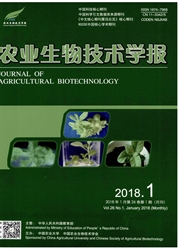

 中文摘要:
中文摘要:
采用Ficoll密度梯度离心法分离第19期(孵化68~72 h)艾维茵鸡(Gallus domesticus)生殖嵴原始生殖细胞(PGC),通过体细胞-PGC共培养进行了原代和传代培养,对PGC进行了碱性磷酸酶(AKP)和过碘酸雪夫氏反应(PAS)鉴定,并用细胞增殖核抗原(PCNA)免疫细胞化学检测了传代于鸡胚饲养层上PGC的增殖活性.培养的PGC经AKP和PAS鉴定均为阳性,AKP阳性为红棕色,PAS阳性为深红色,PCNA染色显示PGC集落为红棕色,表明PGC处于增殖状态.同时比较了不同体外培养条件(5%~20%胎牛血清(FCS),ITS培养液(M199+10μg/mL胰岛素+5μg/mL转铁蛋白+3×10-8 mol/L亚硒酸钠),条件培养液,15%FCS+ITS,15%FCS+40%条件培养液)下PGC增殖情况.发现未经密度梯度离心的PGC生长较离心的PGC好,且5%FCS在原代培养中起较好的促增殖作用;而传代培养时在不同培养条件下,5%FCS组或ITS组形成的PGC集落的直径较大,而仅用单纯的条件培养液效果并不明显.结果表明除鸡胚饲养层可作为PGC增殖的支持体系外,在体细胞-PGC共培养方式下5%FCS或单独的ITS也可作为PGC体外增殖的一种培养体系.
 英文摘要:
英文摘要:
Primordial germ cells (PGCs) were isolated from the genital ridges of Avian chicken (Gallus domesticus) embryos at 19th stage and purified by Ficoll density-gradient centrifugation. PGCs were co-cultured with somatic cells in primary culture and subculture. Identification of PGCs was carried out by histochemical methods including alkaline phosphatase (AKP) and periodic acid-Schiff (PAS) staining, and proliferating PGCs in subculture was demonstrated by immunocytochemistry of proliferating cell nu- clear antigen (PCNA). Meanwhile, proliferating activity of PGCs was compared under different culture conditions among 5% -20% fetal calf serum (FCS), ITS (M199+10 μg/mL insulin+5 μg/mL transferrin + 3 × 10^-8 mol/L selenite, conditioned medium (CM), 15% FCS+ITS, 15%FCS+40% CM. The results showed that the cultured PGCs were positive for AKP and PAS staining and displayed intensive proliferating activity by PCNA. PGCs grew better without centrifugation than those with centrifugation. PGCs formed larger colonies in media with 5%FCS or ITS than those in other media. The above results indicate that 5%FCS or ITS-supplemented media can be a culture system for PGC proliferation in the somatic cell- PGC coculture, besides the embryonic fibroblast feed layer.
 同期刊论文项目
同期刊论文项目
 同项目期刊论文
同项目期刊论文
 期刊信息
期刊信息
